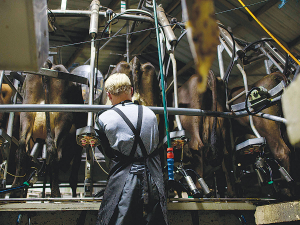South Island dairy production lifts despite stormy summer, feed risks loom
South Island dairy production is up on last year despite an unusually wet, dull and stormy summer, says DairyNZ lower South Island regional manager Jared Stockman.
 One of the main reasons for a shift to flexible milking is to reduce hours, make rosters more flexible and improve work.
One of the main reasons for a shift to flexible milking is to reduce hours, make rosters more flexible and improve work.
With milkings typically taking around 17 to 24 hours a week per worker, many farmers have been focusing on milking smarter to reduce hours and creative ways to shorten the working week - like the 22% who report they are using flexible milking.
One of the milking reasons for a shift to flexible milking is to reduce hours, make rosters more flexible and improve work/life balance for their team.
For Taranaki farmers Daryl and Karyn Johnson, using 3 in 2 milking has seen their team's working week shortened by six hours each per week. Many farmers are also having success with a 10 in 7 milking schedule that maintains traditional morning and afternoon milking times but frees up a few afternoons each week.
Milking smarter has seen some operations introducing a maximum milking time (MaxT), which can reduce milking times without compromising production or udder health. Interestingly, leaving some milk behind in slow milking cows can increase the flow rate in the next milking, improving milking efficiency.
Fonterra suppliers recently received Insights reports showing their milking efficiency compared to similar operations, and how much time they could save by reaching 80-100% milking efficiency. The average possible saving at peak was 8 hours per week.
Align Farms in Mid-Canterbury allow their team to pick shifts, with the first pick rotating between staff, usually with the most popular shifts being morning and midday, leaving afternoons free.
Flexible rostering means the team control their working week, allowing them to pick shifts around other commitments and hobbies, while also allowing Align Farms to take on people looking for work opportunities, including part-time positions. They describe these workers as some of the smartest people, and the farm benefits from having a diverse and interesting workplace.
Reducing the hours your people work to 50 hours or less a week reduces stress, fatigue, and the risk of accidents, and helps you attract and keep good employees.
For more information visit www.dairynz.co.nz/milking
Seonaid Aitchison is DairyNZ solutions and development specialist.
According to the latest Fresh Produce Trend Report from United Fresh, 2026 will be a year where fruit and vegetables are shaped by cost pressures, rapid digital adoption, and a renewed focus on wellbeing at home.
The Roar is a highlight of the game hunting calendar in New Zealand, with thousands of hunters set to head for the hills to hunt male stags during March and April.
OPINION: The past few weeks have been tough on farms across the North Island: floods and storms have caused damage and disruption to families and businesses.
European dairy giant Arla Foods celebrated its 25th anniversary as a cross-border, farmer-owned co-operative with a solid half-year result.
The sale of Fonterra’s global consumer and related businesses is expected to be completed within two months.
Fonterra is boosting its butter production capacity to meet growing demand.